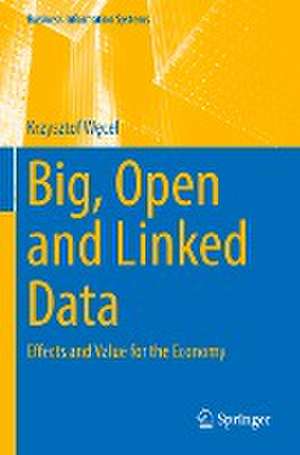Big, Open and Linked Data: Effects and Value for the Economy: Business Information Systems
Autor Krzysztof Węcelen Limba Engleză Paperback – 26 sep 2023
| Toate formatele și edițiile | Preț | Express |
|---|---|---|
| Paperback (1) | 639.41 lei 6-8 săpt. | |
| Springer International Publishing – 26 sep 2023 | 639.41 lei 6-8 săpt. | |
| Hardback (1) | 645.60 lei 6-8 săpt. | |
| Springer International Publishing – 25 sep 2022 | 645.60 lei 6-8 săpt. |
Preț: 639.41 lei
Preț vechi: 752.24 lei
-15% Nou
Puncte Express: 959
Preț estimativ în valută:
122.36€ • 126.98$ • 102.28£
122.36€ • 126.98$ • 102.28£
Carte tipărită la comandă
Livrare economică 17-31 martie
Preluare comenzi: 021 569.72.76
Specificații
ISBN-13: 9783031071492
ISBN-10: 3031071492
Ilustrații: XVII, 256 p. 1 illus.
Dimensiuni: 155 x 235 mm
Greutate: 0.39 kg
Ediția:1st ed. 2022
Editura: Springer International Publishing
Colecția Springer
Seria Business Information Systems
Locul publicării:Cham, Switzerland
ISBN-10: 3031071492
Ilustrații: XVII, 256 p. 1 illus.
Dimensiuni: 155 x 235 mm
Greutate: 0.39 kg
Ediția:1st ed. 2022
Editura: Springer International Publishing
Colecția Springer
Seria Business Information Systems
Locul publicării:Cham, Switzerland
Cuprins
Introduction.- Open Data as an Economic, Political, and Technical Phenomenon.- Linked Data for Enrichment of Data Assets.- Big Data Organization Challenge.- Macroeconomic Aspects of Data Value.- Microeconomic Aspects of Data Value.- Business Models for Data.- Geographical Profiling with Linked Data.
Notă biografică
Krzysztof Węcel is an Associate Professor at the Poznań University of Economics and Business (Poland). In May 2020, he obtained a habilitation degree from the University of Potsdam (Germany) at the Faculty of Economics and Social Sciences. His main research interest is the intersection of semantic web technologies, open data, and machine learning. He has also a significant experience in big data and business intelligence technologies, ranging from data management through data warehousing to data mining and anomaly detection.
Textul de pe ultima copertă
This book examines the recent evolution of the concept of data as an economic and managerial phenomenon. The author first describes and discusses open data and then introduces the concept of linked data, with a focus on assets for reuse. Furthermore, he addresses the main challenges of big data. Value is identified as the main incentive for the adoption of linked data; accordingly, the next two chapters study sources of data value from a macroeconomic and micro economic perspective, respectively. This contributes to the systematization of important issues at the crossroads of enterprise data and data sharing: data ownership, personal data, and data privacy. In turn, the book reveals the role of innovation as a main vehicle for creating value by unifying big, open, and linked data. It studies the ways in which value can be created, transferred, and captured in the form of business models, before the closing chapter verifies the data unification model by combining open andlinked geographical data with big data from a major telecom company.
Caracteristici
Offers a detailed analysis of the impact of open data from a macro and micro perspective Reviews business models relevant for new enterprises working mainly with digital assets Presents a method for geographical profiling from a major telecom company

